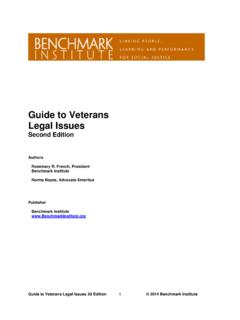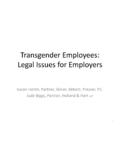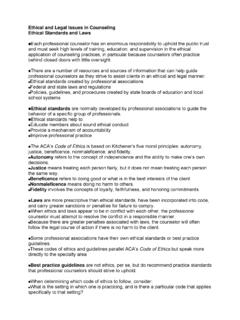Transcription of Legal Issues Surrounding Internships - SAHRMA
1 Legal Issues Surrounding Internships by Rochelle Kaplan What are the Legal Issues Surrounding Internships ? Career services and college relations professionals often raise questions about an intern s employment status, eligibility for workers compensation, and unemployment benefits, and the liability of a school or employer if a student is injured in the workplace. The answers to their questions depend upon an interpretation of applicable state or federal statutes. To determine if an employer/school/student has obligations or rights under the law requires a look at the facts and circumstances of the particular internship and whether the law extends to that situation.
2 Following is information that may be helpful to college and employment professionals in administering their internship programs. What is an internship ? In academic circles, Internships are viewed as a form of experiential education that allows students to apply what they have learned to real work situations and build on their skills. Among employers, Internships serve as an opportunity to train students in their operations and to identify prospective hires. Some internship programs are part of a school s curriculum either students receive credit for the internship and/or the experience is required for graduation.
3 In other situations, faculty may be involved in recommending and providing oversight to students, but no credit is given by the school for participation in the internship . In still other situations, the employer advertises the internship position in the career services office, and the school has no involvement other than the posting. The one common thread in all Internships is that the work is related to the student s course of study. What is an intern s employment status? Generally speaking, the various employment laws do not use the term intern, nor do they provide a detailed definition of the term employee.
4 For example, workers compensation laws typically define employee as an individual who performs services for another for valuable consideration. Similarly, Title VII of the Civil Rights Act, the federal employment discrimination law, defines an employee as an individual who is employed by an employer. In cases involving the issue of a worker s status, the courts consider several factors to determine if the worker is, in fact, an employee or an independent contractor. These factors include: the hiring party s right to control the manner and means by which the work is accomplished; the skill required to perform the work; the source of the equipment and tools needed to accomplish the work; the location of the work; the duration of the relationship between the parties; whether the hiring party has the right to assign additional projects to the hired party; the extent of the worker s discretion over when and how long to work; the method of payment; the worker s role in hiring and paying assistants.
5 Whether the work is part of the regular business of the hiring party; whether the worker provides services to any other organization; the provision of employee benefits; and the tax treatment of the worker by the hiring party. Although no single factor is definitive, the courts place the greatest emphasis on the first factor that is, on the extent to which the hiring party controls the manner and means by which workers complete their assigned tasks. Based on a review of these factors, it is unlikely that any court would consider an intern an independent contractor.
6 If interns are considered employees under the law, the employer must not only pay payroll taxes on the interns salaries, but also afford the interns the same Legal protections as other employees, such as nondiscriminatory treatment, right to sue for harassment, and eligibility for workers compensation. Must an employer pay wages to an intern? The answer to this question depends upon whether the intern is considered a learner/trainee under the federal Fair Labor Standards Act (FLSA) or the state equivalent. The Department of Labor (DOL) has developed six criteria for differentiating between an employee entitled to minimum wage and a learner/trainee who, while an employee, may be unpaid.
7 The criteria are: 1. The training, although it includes actual operation of the facilities of the employer, is similar to that which would be given in a vocational school. 2. The training is for the benefit of the students. 3. The students do not displace regular employees, but work under the close observation of a regular employee or supervisor. 4. The employer provides the training and derives no immediate advantage from the activities of students, and, on occasion, the operations may actually be impeded by the training. 5. The students are not necessarily entitled to a job at the conclusion of the training period.
8 6. The employer and the student understand that the student is not entitled to wages for the time spent in training. Of those criteria, three are very straightforward. Interns cannot displace regular employees. They are not guaranteed a job at the end of the internship . And they are aware that they are not entitled to wages during the internship . In many cases, employers pay a stipend to students for meals and lodging or provide tuition assistance. Stipends and tuition assistance are not considered payment of wages for the purpose of determining whether a student is an employee.
9 Likewise, the fact that an employer may ultimately hire the student does not make the intern an employee as long as the employer did not promise the student a job prior to or during the internship . A bit trickier are the criteria regarding training. For one, interns must receive training from the company even if it impedes operations, for example, by taking time away from work to provide the training. Two, the training must be similar to that provided by a vocational school. That is, the intern must get hands-on experience with equipment and processes used in the company.
10 And three, the training must primarily benefit the student, not the company. Since the intern would be learning work skills and procedures that are relevant to his or her field, wouldn t that be benefiting the employer? Several court rulings, while not addressing the criteria head on, seem to suggest that as long as the internship is a prescribed part of the curriculum, is part of the school s educational process, and is predominately for the benefit of the student, the fact that the employer receives some benefit from the student s services does not make the student an employee for purposes of wage and hour law.







